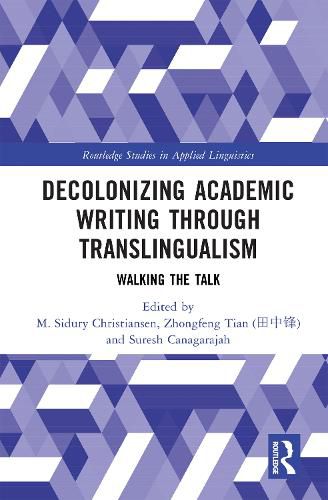Readings Newsletter
Become a Readings Member to make your shopping experience even easier.
Sign in or sign up for free!
You’re not far away from qualifying for FREE standard shipping within Australia
You’ve qualified for FREE standard shipping within Australia
The cart is loading…






This collection explores innovative ways to embody translingual practices in academic writing, showcasing how multilingual authors can effectively leverage their linguistic resources in research and publication. Recognizing that traditional academic writing often suppresses multilingual voices, this book advocates for a decolonized approach that embraces diverse linguistic expressions and knowledge representations for social change.
The volume features perspectives from scholars across various disciplines and linguistic backgrounds presenting their unique visions of discursive, rhetorical, and linguistic diversity in academic writing. Each chapter showcases its respective author's critical reflections on their language choices. The book offers a counterpoint to existing literature by making the case for the register known as "academic English" as a form both open to change and possible for accommodating diversity, empowering scholars to negotiate the register's norms around their own languages and establish spaces for their own unique voices and identities.
This book serves as a valuable resource for graduate students, faculty, scholars interested in academic writing, TESOL, composition studies, language teaching and learning, and applied linguistics.
$9.00 standard shipping within Australia
FREE standard shipping within Australia for orders over $100.00
Express & International shipping calculated at checkout
This collection explores innovative ways to embody translingual practices in academic writing, showcasing how multilingual authors can effectively leverage their linguistic resources in research and publication. Recognizing that traditional academic writing often suppresses multilingual voices, this book advocates for a decolonized approach that embraces diverse linguistic expressions and knowledge representations for social change.
The volume features perspectives from scholars across various disciplines and linguistic backgrounds presenting their unique visions of discursive, rhetorical, and linguistic diversity in academic writing. Each chapter showcases its respective author's critical reflections on their language choices. The book offers a counterpoint to existing literature by making the case for the register known as "academic English" as a form both open to change and possible for accommodating diversity, empowering scholars to negotiate the register's norms around their own languages and establish spaces for their own unique voices and identities.
This book serves as a valuable resource for graduate students, faculty, scholars interested in academic writing, TESOL, composition studies, language teaching and learning, and applied linguistics.